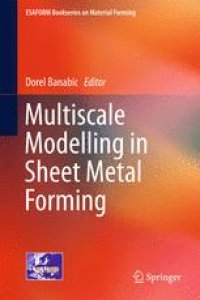
Ebook: Multiscale Modelling in Sheet Metal Forming
Author: Dorel Banabic (eds.)
- Tags: Operating Procedures Materials Treatment, Characterization and Evaluation of Materials, Nanotechnology and Microengineering
- Series: ESAFORM Bookseries on Material Forming
- Year: 2016
- Publisher: Springer International Publishing
- Edition: 1
- Language: English
- pdf
This book gives a unified presentation of the research performed in the field of multiscale modelling in sheet metal forming over the course of more than thirty years by the members of six teams from internationally acclaimed universities.
The first chapter is devoted to the presentation of some recent phenomenological yield criteria (BBC 2005 and BBC 2008) developed at the CERTETA center from the Technical University of Cluj-Napoca. An overview on the crystallographic texture and plastic anisotropy is presented in Chapter 2. Chapter 3 is dedicated to multiscale modelling of plastic anisotropy. The authors describe a new hierarchical multi-scale framework that allows taking into account the evolution of plastic anisotropy during sheet forming processes. Chapter 4 is focused on modelling the evolution of voids in porous metals with applications to forming limit curves and ductile fracture. The chapter details the steps needed for the development of dissipation functions and Gurson-type models for non-quadratic anisotropic plasticity criteria like BBC 2005 and those based on linear transformations. Chapter 5 describes advanced models for the prediction of forming limit curves developed by the authors. Chapter 6 is devoted to anisotropic damage in elasto-plastic materials with structural defects. Finally, Chapter 7 deals with modelling of the Portevin-Le Chatelier (PLC) effect.
This volume contains contributions from leading researchers from the Technical University of Cluj-Napoca, Romania, the Catholic University of Leuven, Belgium, Clausthal University of Technology, Germany, Amirkabir University of Technology, Iran, the University of Bucharest, Romania, and the Institute of Mathematics of the Romanian Academy, Romania. It will prove useful to postgraduate students, researchers and engineers who are interested in the mechanical modeling and numerical simulation of sheet metal forming processes.